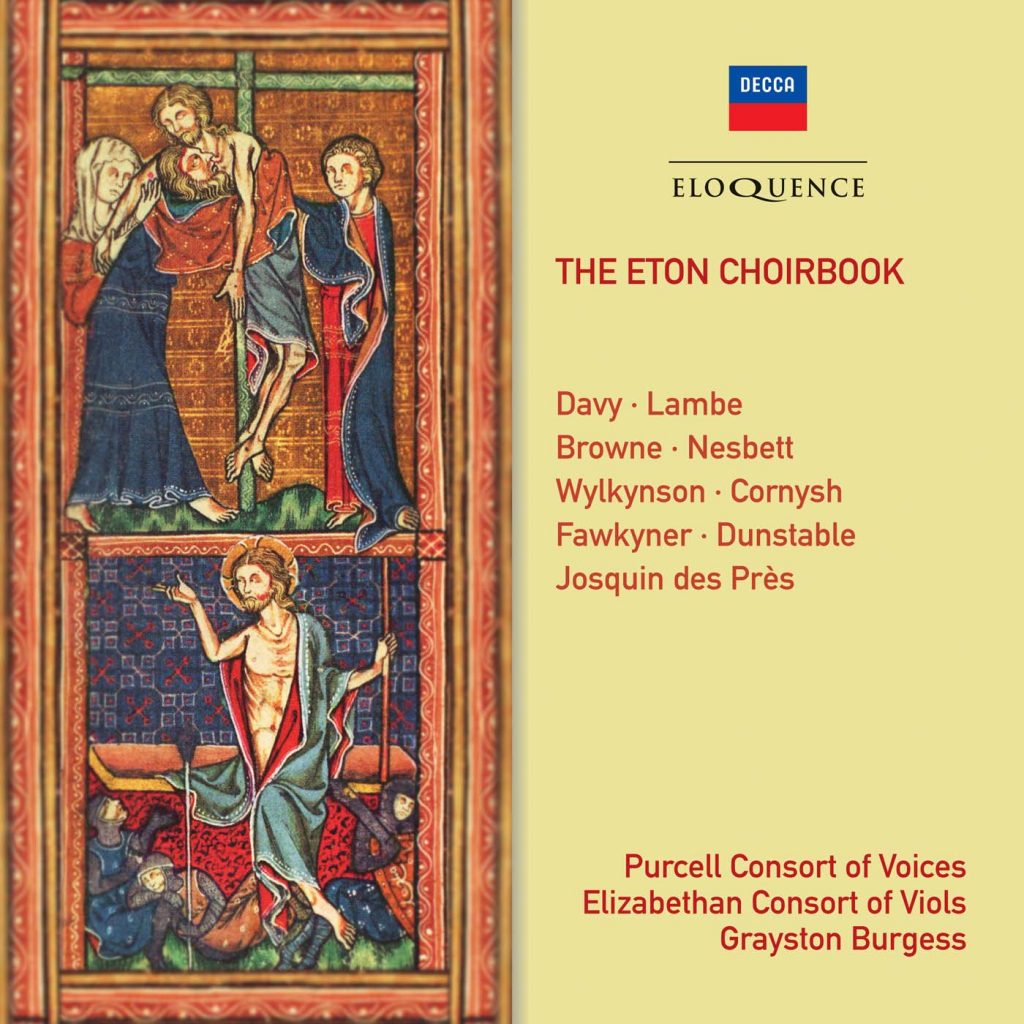The first substantial survey of the Eton Choirbook’s treasures on record, newly remastered, compiled and reissued on CD for the first time.
Copied out between 1490 and 1502, the Eton Choirbook is the most substantial extant source of English liturgical polyphony from the late 15th and very early 16th centuries. The architectural historian Nicholas Pevsner described the late-perpendicular style of buildings like the chapels of Eton and King’s College, Cambridge, as a ‘union of practical, matter-of-fact spirit with a sense of mystery, and an almost oriental effusion of ornament’. What we contemplate in these buildings we may hear mirrored by the music of the Eton Choirbook.
From the 1920s onwards attempts were made to perform and record pieces from the Eton Choirbook but they were hampered both by the technical demands of the music – often as thrilling as it is rhythmically complex and metrically unstable – and by its relative unfamiliarity to English cathedral choirs. Only in 1968 was a successful attempt madeby Argo to record a selection on two albums, which are united here.
The performers constituted an astute combination of an all-male choral foundation (from St Margaret Street in London) with the professional ensemble of the Purcell Consort of Voices, directed by their founder Grayston Burgess, who died in 2019. The first album documented the setting of the St Matthew Passion by Richard Davy and the second included a selection of motets compact (the Ave Maria of Cornysh and Nesciens Mater of Lambe) and spacious, most notably Browne’s Stabat Mater and Fawkner’s Gaude Rosa. The singing is robust rather than ethereal, and the albums blazed a trail both for this repertoire and style of performance which has been emulated by many professional early-music groups during the past half-century.
Filling out this 2CD set is a third Purcell Consort of Voices album of 15th-century repertoire recorded by Argo and never previously issued complete on CD. The flowing polyphonic style of John Dunstable and the sublime reach of Josquin des Prez are surveyed with both sacred and secular, instrumental and vocal works; highlights include the courtly elegance of Dunstable’s O Rosa Bella and Josquin’s affecting tribute to his teacher in the Déploration sur la Mort de Okeghem.
CD 1
RICHARD DAVY (1465–1507)
1–24 Dominica in Ramis Palmarum: Passio Domini
Passion according to St. Matthew. For Palm Sunday
Ian Partridge, tenor · Christopher Keyte, bass
All Saints’ Margaret Street Choir Boys
Purcell Consort of Voices
Grayston Burgess
JOSQUIN DES PRÈS (c.1450/1455–1521)
25 Petite Camusette
26 Coeurs Desolez
27 La Déploration sur la Mort de Johan Okeghem
28 Vive le Roy
29 El Grillo
30 La Bernadina
31 Basies Moy
32 Fortuna Desperata
33 Ave Maria
Elizabethan Consort of Viols
Purcell Consort of Voices
Grayston Burgess
CD 2
1 LAMBE Nesciens Mater
2 BROWNE Stabat Mater
3 NESBETT Magnificat
4 WYLKYNSON Salve Regina
5 CORNYSH Ave Maria mater Dei
6 FAWKYNER Gaude Rosa sine spina
All Saints’ Margaret Street Choir Boys
Purcell Consort of Voices
Grayston Burgess
JOHN DUNSTABLE (1390–1453)
7 O Rosa bella
8 Ave Maris Stella
9 Alma Redemptoris Mater
10 Sancta Maria Succurre Miseris
11 Veni Sancte Spiritus – Veni Creator Spiritus
Elizabethan Consort of Viols
Purcell Consort of Voices
Grayston Burgess
FIRST CD RELEASE ON DECCA
Recording Producers: Michael Bremner
Balance Engineers: Stanley Goodall
Recording Locations: Decca Studio 3, West Hampstead, London, UK, 24–27 July 1967 (Davy, Lambe, Browne, Nesbett, Wylkynson, Cornysh, Fawkyner); St. John’s, Smith Square, London, UK, 19–22 October 1970 (Josquin des Près, Dunstable)
Remastering Engineer: Chris Bernauer
Original Argo LP Releases: ZRG 557 (Lambe, Browne, Nesbett, Wylkynson, Cornysh, Fawkyner: May 1968); ZRG 558 (Davy: March 1968); ZRG 681 (Josquin des Près, Dunstable: July 1971)
‘A very moving and beautiful presentation, and the level of choral and solo singing is quite extraordinary… The recorded sound is faultless.’ Stereo Review, December 1969 (Davy)
‘The performances are a model of how this music should sound; they are marvellously stylish and very courtly in “affect”… The sound is spectacular.’ Stereo Review, October 1972 (Dunstable/Josquin)
‘Burgess has clearly shot for the most gorgeous sound obtainable by his group and he has got it. O rosa bella… is one of the loveliest performances of this wonderful song I have ever heard.’ High Fidelity, December 1972 (Dunstable/Josquin)
‘The singing is robust, not ethereal or grisaille… these recordings are in some ways the most successful of all Eton Choirbook issues.’ Musical Times, May 1997

